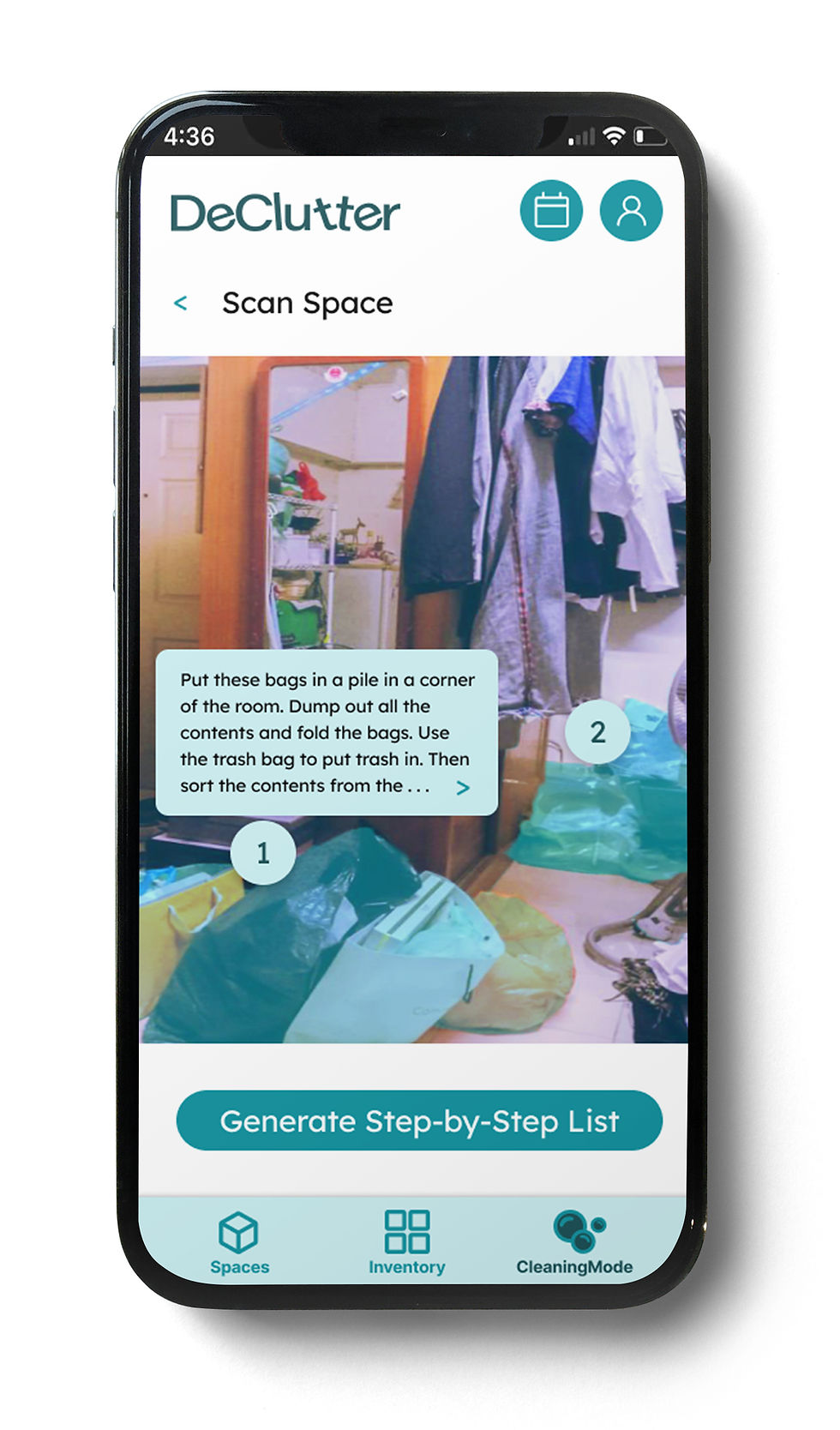The smart organization app that helps you declutter, maintain spaces, and keep track of your items.
by Erica Elizondo

The DeClutter Case Study
Messy and unorganized habits are a common struggle, especially when it comes to managing spaces like junk drawers. These catch-all areas often become chaotic as people toss in random items—receipts, batteries, keys, or old chargers—without much thought.
Over time, the clutter can pile up, making it difficult to find anything or even remember what's inside. Organizing such spaces can feel overwhelming, as it requires not only sorting through the mess but also deciding what to keep, toss, or relocate. Without consistent effort, junk drawers quickly revert to their disorganized state, highlighting how challenging it can be to maintain order in the midst of everyday chaos.
With this in mind, Declutter is here to provide a solution...
is a smart organization mobile app that utilizes AI tools
to scan messy spaces and provide tips and suggestions to help organize. It also has features including a calendar to help set routine cleaning reminders, an inventory database to keep track of important items, and other visual maps that help track and organize items.
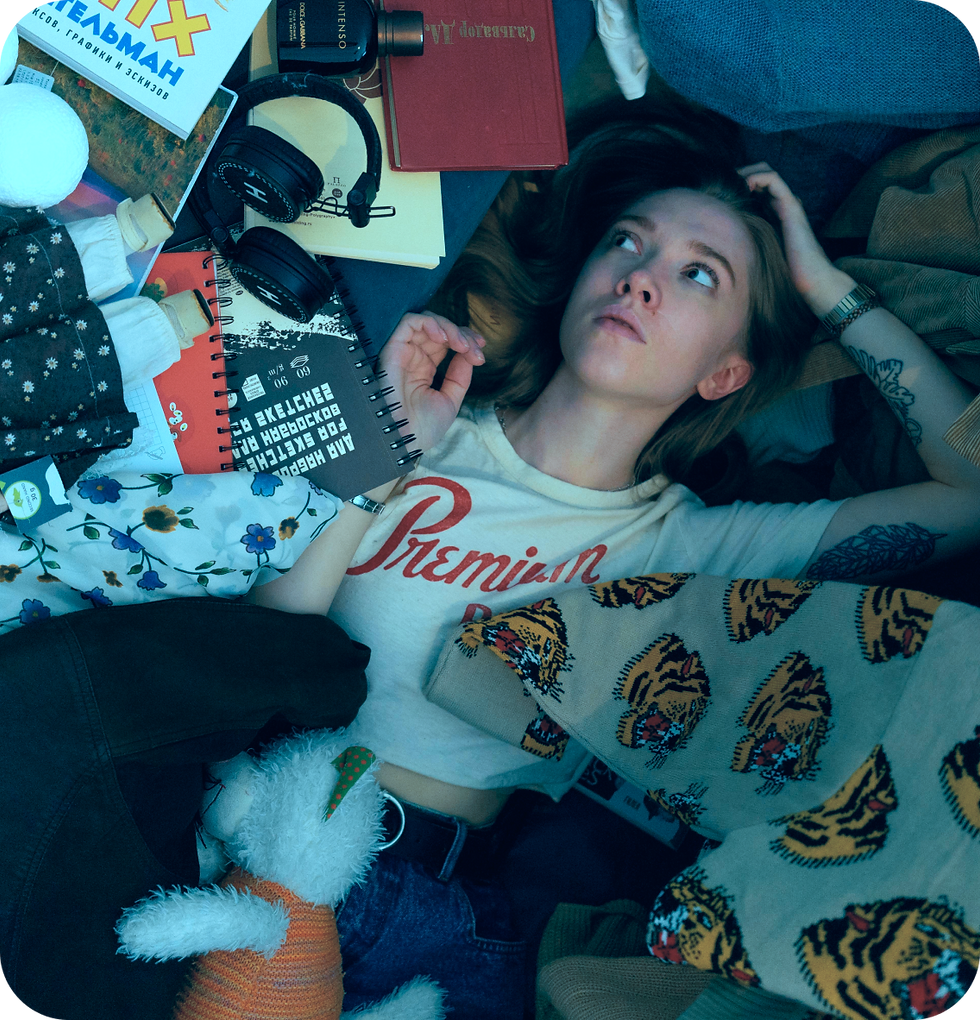
Research
Survey Insights
29 respondents
“How often do you clean your personal space (room, dorm, etc.)?”
3%

clean whenever
10%
clean every other day
7%
clean everyday
10%
52%
clean monthly
clean once a week
17%
clean bi-weekly
“How often do you decide to clean your ‘junk space’?”
4%
4%

clean yearly
8%
don’t clean
it varies
12%
clean monthly
52%
12%
clean whenever they get around to it
clean bi-weekly
8%
clean monthly
Based on these pie chart results, it appears that “junk spaces” can be more intimidating to clean or overall a more difficult task than just cleaning a room, so people will clean it less often, if at all.
“Is there anything you do to make cleaning easier for yourself?”
45%
of respondents mentioned playing some sort of media like music, podcasts, YouTube, or Movies during the cleaning process.
This result alone, influenced me to include a media aspect into my app that I hadn’t initially considered.
“While cleaning, what do you find is the hardest part of the task?”
“Finding time.”
“Deciding what needs to leave and what stays.”
“Starting the task.”
“Finding a place for things that makes sense.”
“Keeping track of some items.”
Considering all of this important feedback, allowed me to prioritize these kinds of pain points that people had during the decluttering process.
72%
of respondents thought that organization suggestions would be helpful.
62%
of respondents thought suggestions on getting rid of items would be helpful.
72%
of respondents thought being able to track or visualize the location of an item would be helpful.
*Many of these respondents specifically mentioned having a map as a visual for this.
Pain Points/Survey Insights
-
Finding designated time to clean
-
Making decisions on what to keep and what to throw out
-
Figuring out where to start when cleaning
-
Finding the best way to organize spaces
-
Keeping track of important items/being able to locate/visualize where they are
-
Media is a big motivator when cleaning
Benchmarking



-
Closet app that catalogs and helps you organize clothes you own
-
Provides multiple methods of organization (filters, tags, search, color, season, etc.)
-
Incorporates calendar feature to plan outfits ahead of time/log outfits you’ve already worn
-
Makes adding items easy with an auto-background removal
-
Allows users to put as much or as little information as they want about an item
-
You get as much out of this app as you put in
Main Takeaways
-
Calendar Feature to better organize
-
Using filters as a way to catalog
-
Taking away extra steps for user by automatically doing tasks/filling in things when adding items

Samsung Gallery

-
An app that helps you organize you pictures and videos
-
Automatically logs the date media was taken
-
You can auto scan objects and copy that part of the image or remove the background
-
It can recognize certain faces/people and recognize them (and connect them with contacts)
-
Lets you add folders and group items how you want
-
Creates stories based on related things
Main Takeaways
-
Automatically log dates
-
Auto scan objects
-
Auto recognize and identify things in images
Key Takeaways
Both apps focus on organization and have an element of making a task easier with auto features like removing backgrounds/ recognizing things based on imagery.
Sketches
Above, are all the iterative sketches I did for the screens. Below, are the main four screens highlighting the Tabs: Inventory, CleaningMode, and ‘Junk’ spaces, as well as the calendar feature. The four other mid-fi screens below that are some main important tasks of the app I wanted to highlight including editing an item and scheduling a clean time on the calendar.




Inventory
CleaningMode
Calendar
Spaces




Schedule a Clean
Scan Space
Suggestions
Edit Item
Mid-Fidelity Screens
Above, are all the Mid-fi screens created for the main user task flows including, adding an item, scanning a space, scheduling in the calendar, the onboarding process, and searching for items. Below, are the main screens that were previously highlighted in the sketches, translated into mid-fi form.

Inventory

Suggestions

CleaningMode

Edit Item

Calendar

Schedule a Clean

Spaces

Scan Space
User Testing Results
With the mid-fi’s I had users go through the prototyped tasks as well as look at some screens for A/B testing.


A
B
Other adjustments that were received directly from feedback and through observation included:
Making onboarding more specified and detailed
Having the Tabs bar be on every page and not only some
Making the “DeClutter” logo at the top also a button to get back to the “perceived homepage” a.k.a. the inventory tab
Showcase what the “staff” and “office” tabs at the top mean
User’s preferred option B over option A because not being presented with too many objects on one page, makes the experience less overwhelming when scrolling through the inventory.



It was suggested that a user should be able to “pin” an item. This way, if there’s a certain item they particularly need to look at more often or track, it can be more conveniently at the top. I also got rid of the “view map” option at the top since it was considered unnecessary there and replaced it with an important “starred” category and a filter option to search items with tags, color, date, etc.

The name for the tab “Junk Spaces” was changed to just “Spaces” based on a user’s comment about how not everything in this tab is not inherently a messy space and it became confusing.

The icon used for the “CleaningMode” tab was also changed. The original one confused users and didn’t represent the act of cleaning very well, so the icon was changed to soap bubbles for a better mental model.


The tags were noted to be a little too small during testing so they were made bigger for easier readability as well as being easier to tap. I also decided to add a quick calendar button for picking a date to make the experience easier on the user.



For the onboarding process, adding a “Next” button after an item was clicked on was suggested, since it became confusing for users when they could continue through to the next step. Clarification on “Selecting all that apply” was added as well so there was less confusion on how many options could be clicked.

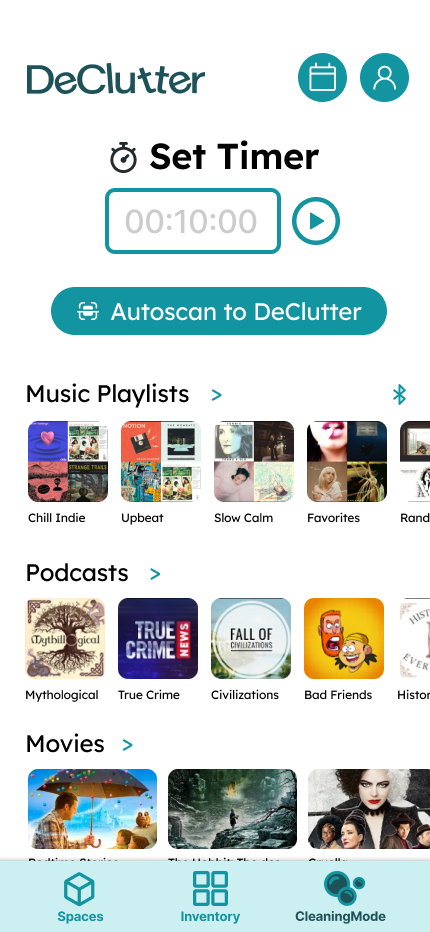
Since the timer is the main feature of this CleaningMode page, it was suggested that it be a bigger part of the screen.
Brand Style Guide
Typography
Lexend ExtraLight
Lexend Light
Lexend Regular
Lexend Medium
Lexend SemiBold
Lexend Bold
Lexend ExtraBold
Colors
#1C5258
#1394A1
#CCEFF2
#000000
#AAAAAA
Icons
Components
Button
Check Box
Check Box
Fill Box
Big Button
Fill Box
Back
<
Next
<
Big Button
Search Item Here
Search Item Here
AM
PM
Button
AM
PM
Icon Button
tag
<
Scroll Header
Hi-Fidelity Screens
Inventory

CleaningMode

Calendar

Spaces
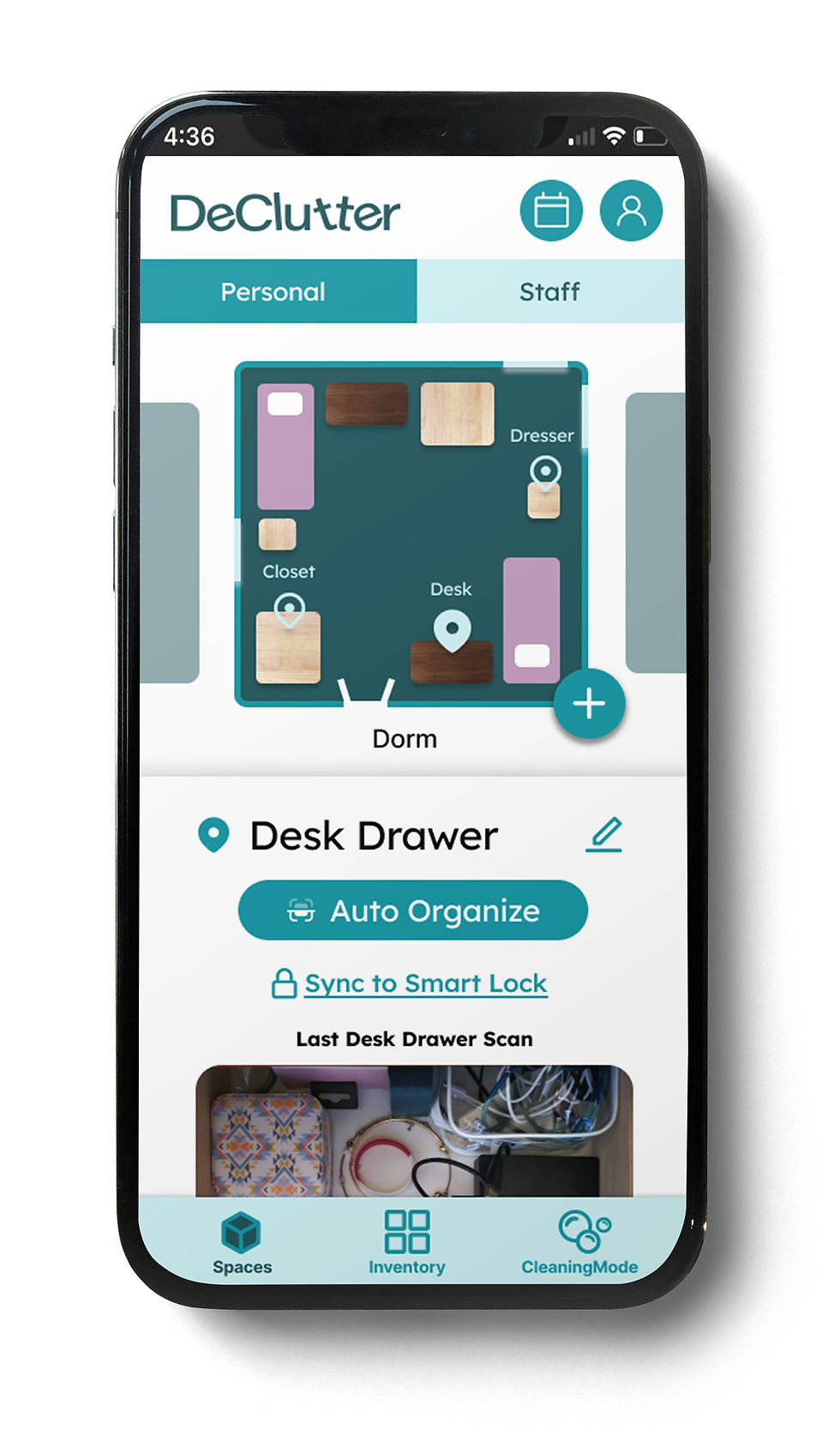
Suggestions
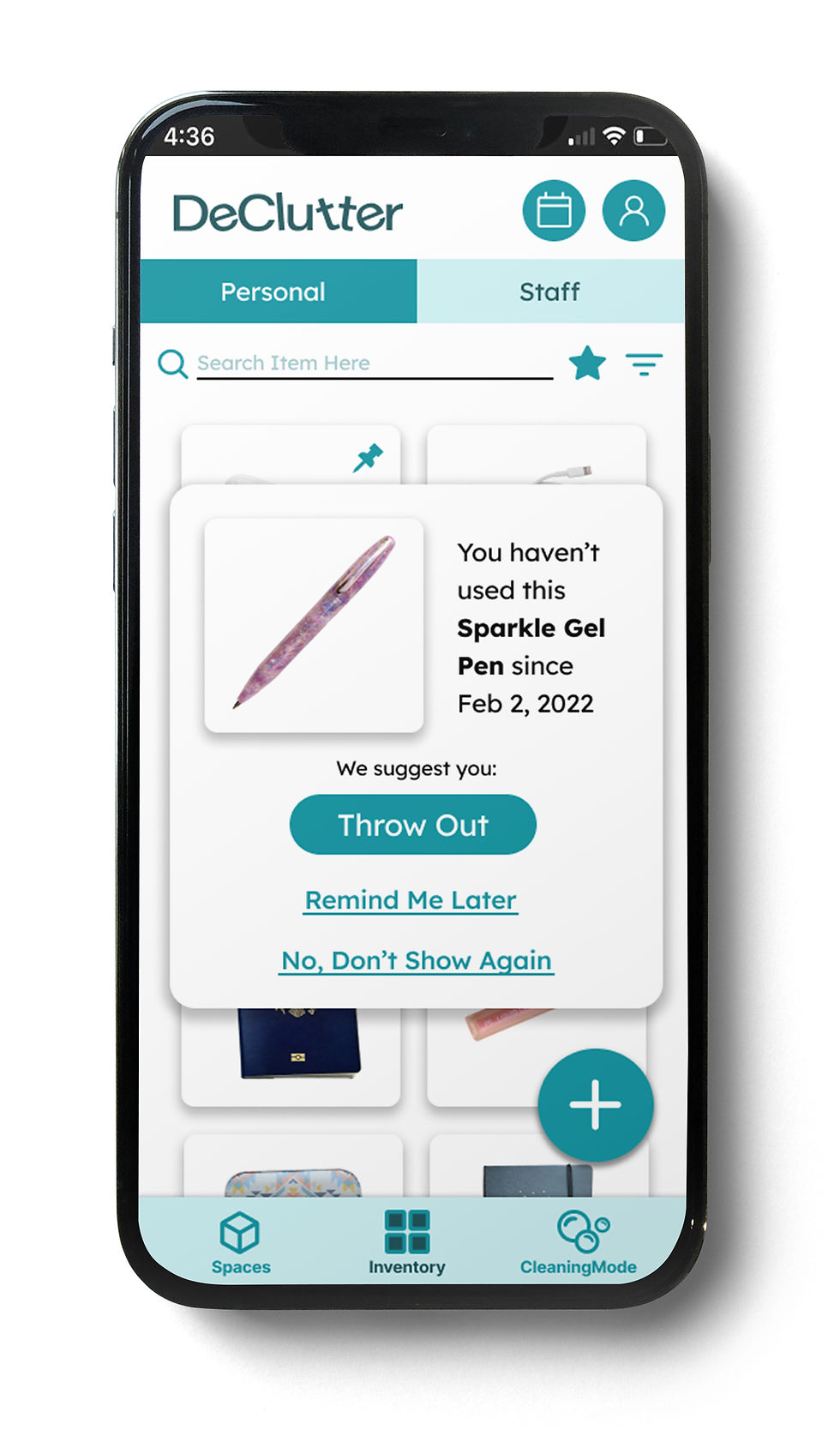
Edit Item
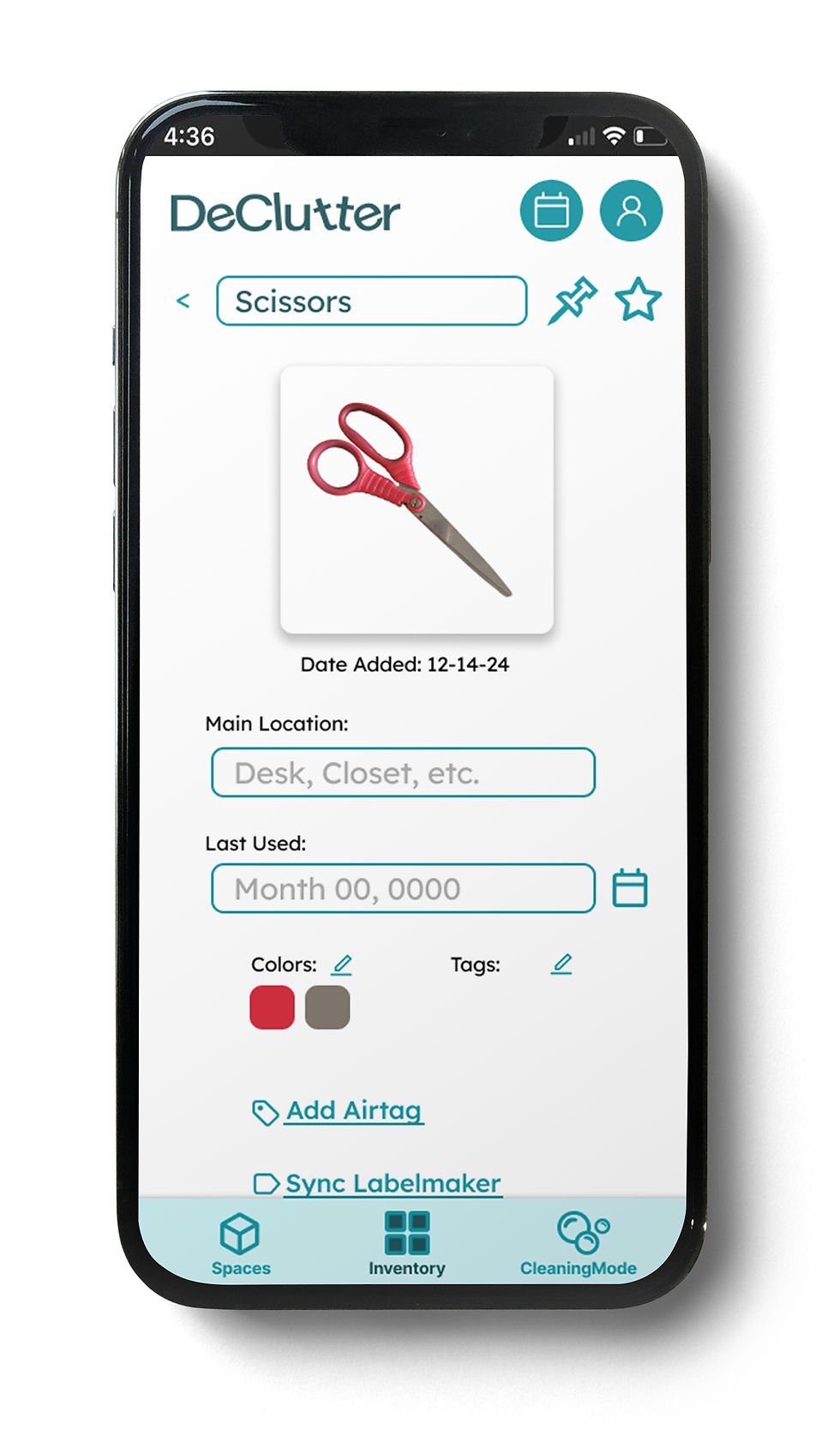
Schedule a Clean

Scan Space
